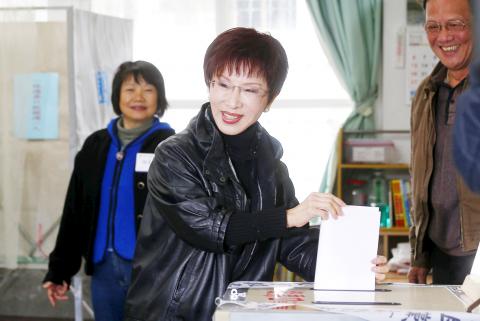The Chinese Nationalist Party (KMT) yesterday elected former deputy legislative speaker Hung Hsiu-chu (洪秀柱) as the party’s first chairwoman in its more than 100-year history.
Hung secured 56.16 percent of the vote in the by-election, receiving 78,829 out of 140,358 votes cast, sparing the need to go to a second round of voting, which would have been required if none of the four candidates garnered more than 50 percent of the vote.
Voter turnout was 41.61 percent from a total of 337,351 eligible voters.

Photo: Reuters
KMT Acting Chairperson Huang Min-hui (黃敏惠) placed second, securing 46,341 votes, or 33.02 percent.
Taipei City Councilor Lee Hsin (李新) finished third, winning 7,604 votes, or 5.42 percent, while Legislator Apollo Chen (陳學聖) won 6,784 votes, or 4.83 percent.
After the final results were published, Hung thanked all party members, regardless of whether they voted for her, for staying with the party and showing their support when the party is at its nadir.
“As long as we are together, solidarity and hope will be in our hands. I will lead the party to restore our homeland, which has been in ruins,” she said.
When asked what her plan for cross-strait affairs would be and whether she would plan a trip to China, she said that she has no such plans, adding that KMT-Chinese Communist Party dialogue would continue.
“We can have a firmer grasp of our future if we have a better understanding of [China] and if we can help convey [China’s responses] to the government,” she said.
According to statistics provided by the KMT, Hung received the greatest support in Kinmen County, among overseas KMT members and in Lienchiang County, securing 85.58 percent, 78.51 percent and 74.66 percent of votes respectively.
Hung also received broad support in the two largest electoral districts — New Taipei City (41,405 possible voters who cast 16,792 votes) and Kaohsiung (42,420 voters who cast 16,094 votes) — where she received 10,924 votes and 9,360 votes respectively, whereas Huang received 4,131 and 4,956 votes respectively.
The by-election was marred by numerous reports of election violations.
A day before the by-election, several Internet users posted messages on the Professional Technology Temple — Taiwan’s largest online academic bulletin board — saying that older members of their families who are KMT members had received two voting notifications with different numbers, meaning that they would be able to vote twice.
Hung’s office yesterday reported a number of voting irregularities encountered across the nation, such as people trying to vote without notifications or identification, voters trying to cast ballots for another person, voting booths that were not curtained off and posters campaigning for Huang placed on the doors of polling stations.

DAREDEVIL: Honnold said it had always been a dream of his to climb Taipei 101, while a Netflix producer said the skyscraper was ‘a real icon of this country’ US climber Alex Honnold yesterday took on Taiwan’s tallest building, becoming the first person to scale Taipei 101 without a rope, harness or safety net. Hundreds of spectators gathered at the base of the 101-story skyscraper to watch Honnold, 40, embark on his daredevil feat, which was also broadcast live on Netflix. Dressed in a red T-shirt and yellow custom-made climbing shoes, Honnold swiftly moved up the southeast face of the glass and steel building. At one point, he stepped onto a platform midway up to wave down at fans and onlookers who were taking photos. People watching from inside

A Vietnamese migrant worker yesterday won NT$12 million (US$379,627) on a Lunar New Year scratch card in Kaohsiung as part of Taiwan Lottery Co’s (台灣彩券) “NT$12 Million Grand Fortune” (1200萬大吉利) game. The man was the first top-prize winner of the new game launched on Jan. 6 to mark the Lunar New Year. Three Vietnamese migrant workers visited a Taiwan Lottery shop on Xinyue Street in Kaohsiung’s Gangshan District (崗山), a store representative said. The player bought multiple tickets and, after winning nothing, held the final lottery ticket in one hand and rubbed the store’s statue of the Maitreya Buddha’s belly with the other,

‘NATO-PLUS’: ‘Our strategic partners in the Indo-Pacific are facing increasing aggression by the Chinese Communist Party,’ US Representative Rob Wittman said The US House of Representatives on Monday released its version of the Consolidated Appropriations Act, which includes US$1.15 billion to support security cooperation with Taiwan. The omnibus act, covering US$1.2 trillion of spending, allocates US$1 billion for the Taiwan Security Cooperation Initiative, as well as US$150 million for the replacement of defense articles and reimbursement of defense services provided to Taiwan. The fund allocations were based on the US National Defense Authorization Act for fiscal 2026 that was passed by the US Congress last month and authorized up to US$1 billion to the US Defense Security Cooperation Agency in support of the

HIGH-TECH DEAL: Chipmakers that expand in the US would be able to import up to 2.5 times their new capacity with no extra tariffs during an approved construction period Taiwan aims to build a “democratic” high-tech supply chain with the US and form a strategic artificial intelligence (AI) partnership under the new tariffs deal it sealed with Washington last week, Taipei’s top negotiator in the talks said yesterday. US President Donald Trump has pushed Taiwan, a major producer of semiconductors which runs a large trade surplus with the US, to invest more in the US, specifically in chips that power AI. Under the terms of the long-negotiated deal, chipmakers such as Taiwan Semiconductor Manufacturing Co (TSMC, 台積電) that expand US production would incur a lower tariff on semiconductors or related manufacturing